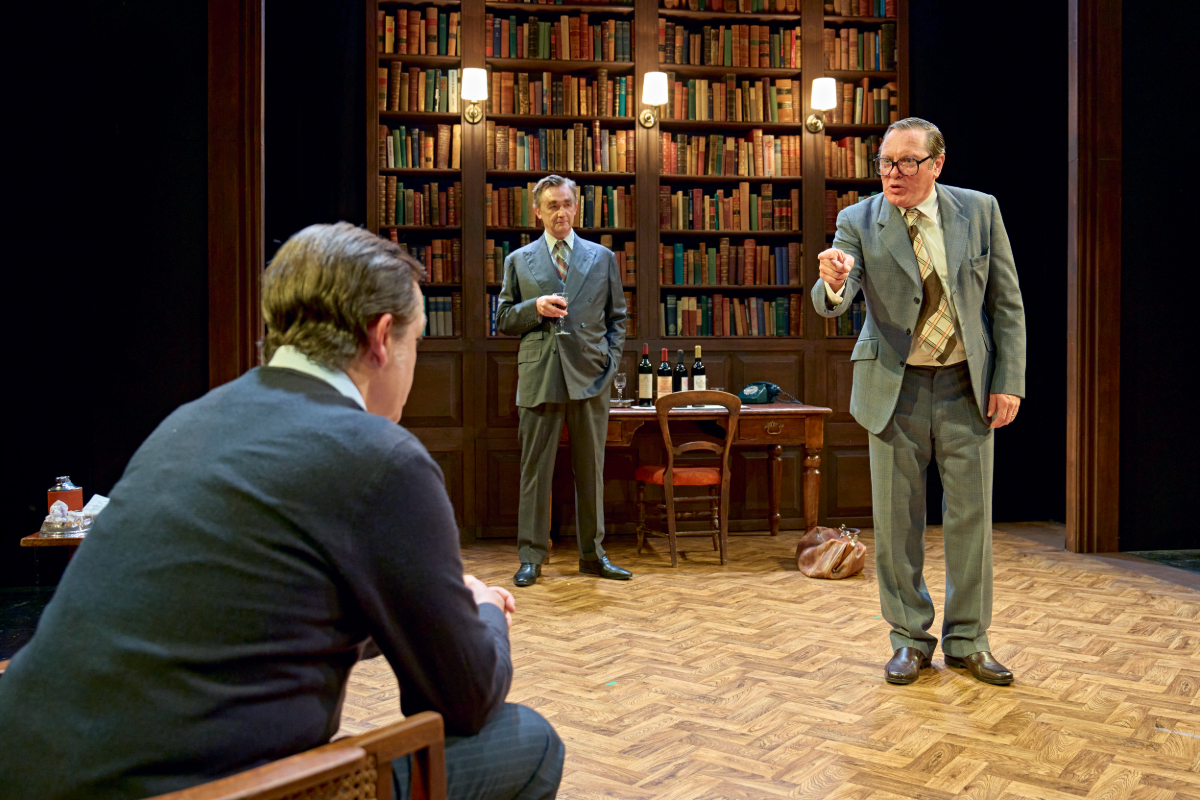There was a time when the only daytime TV (ex-weekends and ex-Wimbledon fortnight) comprised the annual party conferences and the Trade Union Congress. A seemingly endless parade of indistinguishable middle-aged balding white men, with Barbara Castle’s fiery redhead and Margaret Thatcher’s immovable blonde hairdo the only relief, would grab 15 minutes of fame speechifying on the minutiae of policy, some puffing on pipes, some on full-strength Capstans.
It was parochial, boring and almost always of no consequence a week or so later, but I rather miss those days… If you do (and even if you don’t) you will find Robert Khan and Tom Salinsky’s new play, The Gang of Three, a warm bath of nostalgia set in times receding rapidly into the past. But this production is no gentle potter down Memory Lane: the ideas Tony Crosland, Denis Healey and Roy Jenkins discuss in their sparkling banter are very much on point for today. There’s a reason Sir Keir Starmer’s photograph is found four pages from the front of the programme and Tony, Roy and Denis are relegated to four from the back. The three Oxford men bicker about wartime service (this being The Greatest Generation, the one with most to brag about, Denis Healey, a beach master at the Anzio Landings, twice mentioned in dispatches, stays quiet). But the jibes about elections won and elections lost, soon turn to what really interests them – the battle for that mystical, often poisoned, chalice, The Soul of the Labour Party.
The three Oxford men bicker about wartime service (this being The Greatest Generation, the one with most to brag about, Denis Healey, a beach master at the Anzio Landings, twice mentioned in dispatches, stays quiet). But the jibes about elections won and elections lost, soon turn to what really interests them – the battle for that mystical, often poisoned, chalice, The Soul of the Labour Party.
Except they don’t, as the men are pretty much settled on what that is, how to nurture it and how to use it to achieve the political ambitions they share. Okay, Jenkins is keener on The Common Market than the other two, but they’re both arch-pragmatists and that could be resolved. What the play explores so effectively, with dazzling wit and piercing insight into alpha male psychology, is how the three friends and colleagues continually self-sabotage their chances in a decades-long three-way game of Prisoner’s Dilemma. Those fatal personal ambitions skewer any tactical plan to grab the power required to implement their political strategy. That failure skewered them and the Party as a whole, until Tony Blair and his enforcer, Alastair Campbell and consigliere, Peter Mandelson, launched New Labour 20 long years later.
Told in episodes on a timeline that runs from 1972 through to 1980 with one flashback to 1940, egos clash like cymbals, but the men never really fall out – they’re simply too alike to go solo, but they're also too alike to work together. (Maybe it’s the fact that Blair and Gordon Brown were so different that kept them together so long?)
Alan Cox has a lot of fun with Crosland, camp, frank, but fiercely intellectual in his approach to politics and convinced of his own rectitude in all matters. Unlike the other two, he’s known that he was born to rule since his days at prep school – and that carapace of confidence makes him impervious to entreaties to compromise.
As Jenkins, Hywel Morgan (pictured above with Alan Cox and Colin Tierney) is quicker to display temper, keen to flaunt his recently acquired upper-middle class credentials (a defence mechanism to hide the chippy grammar school boy who is never far from the surface) and a self-declared Man of Principles, fond of the grand gesture. He tries to play a long game, but his old friends see through him – Crosland, his lifestyle catching up with him, didn’t even get the chance of a long game, gone at 59.
Signature eyebrows to the fore, Colin Tierney catches Healey’s voice and mannerisms and his Realpolitiker’s respect for power and its limits. As is the case today, he was a Labour Chancellor painted into a corner by the public finances, who made decisions more unpopular in his own party than in others. But he was derailed by strikes, unemployment and a simple, if duplicitous, message from the Right. “Labour Isn’t Working” indeed…
You don’t have to agree with these men to enjoy their company (and how many politicians can you say that about today?) and there is real food for thought between the laughs and the odd knowing smile provoked by the sparkling script, especially in allusions to more recent debates and personalities. Directed at pace by Kirsty Patrick Ward, they don’t outstay their welcome either in a crisp 90 minutes runtime.
Almost comically well located on Upper Street, the natural home of the Chattering Classes, it’s spectacularly well-timed too as a Labour Government, tossing and turning on a roiling sea of international and domestic problems, seeks to define what its version of socialism is actually for.
Somehow I doubt that we’ll see Keir, Rachel and Yvette portrayed on stage in 2075 – at least, I know I won’t. And I don’t think I regret it!















Add comment